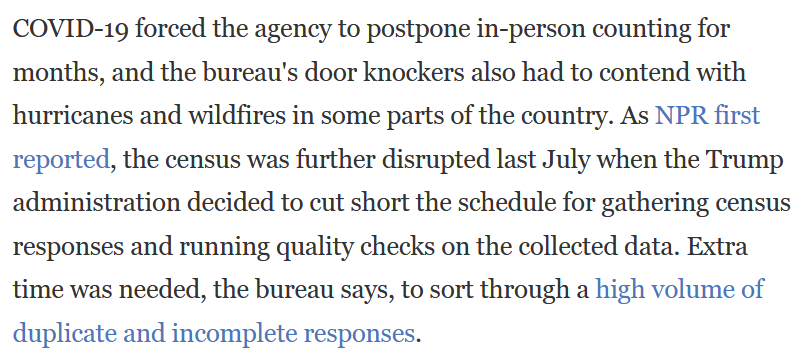
The new census results coming out today will reveal an incomplete picture of race and ethnicity in the United States.
I wrote about why the 2020 census, like every earlier count, is producing flawed data:
npr.org/2021/08/12/101…
I wrote about why the 2020 census, like every earlier count, is producing flawed data:
npr.org/2021/08/12/101…
2. While the Census Bureau says the new data is "high quality" & "fit to use for redistricting," there are many complications baked into these new race/ethnicity statistics that I've been tracking — including the pandemic and interference by former President Donald Trump's admin.
3. Here's the backstory you need to know about the new race/ethnicity data the Census Bureau's releasing today:
People of color were likely undercounted in the 2020 census
People of color were likely undercounted in the 2020 census

5. Data about Latinos may be skewed because many people were confused by how the 2020 census forms asked about race/ethnicity 



6. Middle Eastern and North African (MENA) origins will be hidden in the race/ethnicity data the Census Bureau's releasing today 



7. The racial/ethnic demographics of rural communities and small geographic areas may be obscured by the new privacy protections the Census Bureau's applying to 2020 census redistricting data.
My explainer on differential privacy:
npr.org/2021/05/19/993…
My explainer on differential privacy:
npr.org/2021/05/19/993…
8. A person's racial/ethnic identity can change from census to census & some groups may be "bigger than you would actually see" in one census, @UMNSociology's Carolyn Liebler says (paper by Liebler, Sonya Porter, Leticia Fernandez, James Noon, Sharon Ennis read.dukeupress.edu/demography/art… 

@UMNSociology 9. Write-in responses about race and ethnicity in 2020 were categorized differently than in 2010 — and that could increase the number of people recorded in the 2020 results as identifying with more than one racial group 



@UMNSociology 10. There are a lot of guesses based on estimates/projections about what the 2020 census data will show about changes to the white population in the U.S.
The thing to keep in mind is it depends a lot on how you define "white"

The thing to keep in mind is it depends a lot on how you define "white"


@UMNSociology 11. Why is all of this flawed race/ethnicity data from the 2020 census important?
For better or worse, it's used to redraw voting districts, enforce antidiscrimination laws, and inform research and policymaking for the next decade.
For better or worse, it's used to redraw voting districts, enforce antidiscrimination laws, and inform research and policymaking for the next decade.
@UMNSociology 12. Census data — like all other data — does not just appear out in the world waiting to be gathered. It's produced through a series of decisions. And it looks like we're going to have to live with the choices baked into this new race/ethnicity data until after the 2030 census.
• • •
Missing some Tweet in this thread? You can try to
force a refresh








